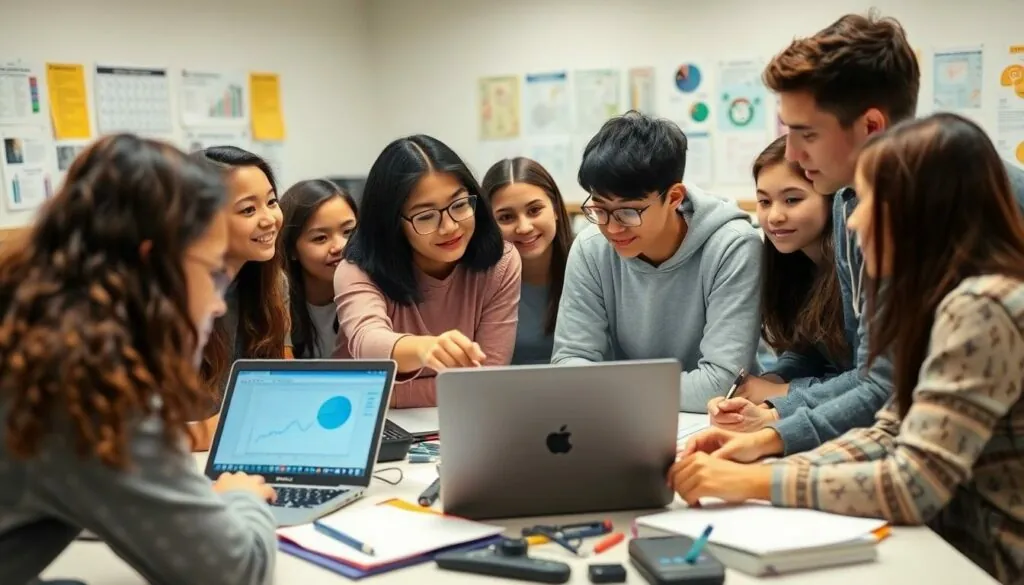Table of Contents
ToggleSelecting the perfect research topic can feel like finding a needle in a haystack for high school students. Whether it’s for a science fair project environmental studies or social science research picking the right topic makes all the difference between an A+ paper and a mediocre grade.
Today’s high school students face unique challenges when choosing research topics that stand out from their peers. With countless possibilities at their fingertips thanks to the digital age they need guidance to narrow down options and select topics that are both engaging and academically sound. From groundbreaking scientific discoveries to pressing social issues there’s never been a better time to dive into meaningful research that can shape their academic future.
Understanding High School Research Projects
High school research projects provide students with practical experience in academic investigation while developing critical thinking skills. These projects create opportunities for students to explore subjects beyond standard curriculum boundaries through structured research methodologies.
Benefits of Conducting Research in High School
Research projects enhance students’ academic portfolios with tangible evidence of scholarly capabilities. Students develop essential skills in data analysis citation methods source evaluation time management organization. Research experience strengthens college applications by demonstrating initiative intellectual curiosity independent learning abilities.
Key advantages include:
- Mastering academic writing techniques through structured documentation
- Building professional networks with subject matter experts mentors
- Gaining hands-on experience with research methodologies tools
- Developing presentation communication skills through research defense
- Creating original work that contributes to academic discourse
What Makes a Good Research Topic
Effective research topics combine personal interest with academic relevance measurable outcomes. Topics require sufficient available resources credible sources expert guidance to support thorough investigation.
Essential elements of strong research topics:
- Clear defined scope with specific research questions
- Access to primary secondary source materials
- Measurable variables for data collection analysis
- Contemporary relevance to academic field society
- Unique perspective or approach to existing research
- Feasible completion timeline within academic semester
- Alignment with departmental research guidelines
- Potential for meaningful conclusions recommendations
Research topics balance innovation with established academic frameworks to produce valuable insights while maintaining scholarly standards.
Science Research Topics for High School Students
Science research offers high school students opportunities to explore groundbreaking discoveries through hands-on experimentation. These topics combine academic rigor with practical applications across various scientific disciplines.
Biology and Life Sciences
Biology research topics explore living organisms molecular mechanisms cellular processes. Students investigate genetic mutations in fruit flies DNA extraction techniques cell division patterns. Microbiological studies examine bacterial growth in different environments antibiotic resistance patterns food preservation methods. Research projects analyze plant growth responses to environmental stimuli photosynthesis rates under varying light conditions effects of natural compounds on cell development. Laboratory experiments focus on enzyme activity protein synthesis stem cell development tissue culture techniques.
Environmental Science Topics
Environmental science research examines ecological systems human impact on natural habitats. Students measure water quality in local streams soil contamination levels air pollution indicators. Projects analyze renewable energy efficiency solar panel effectiveness wind power generation rates. Studies document biodiversity changes in specific ecosystems invasive species impacts habitat restoration success rates. Research tracks climate change effects on local flora fauna temperature variation patterns precipitation changes. Investigations evaluate waste management systems recycling effectiveness composting efficiency rates.
Physics and Chemistry Projects
Physics chemistry projects combine theoretical concepts with practical applications. Students measure electromagnetic field strengths radioactive decay rates light wave properties. Experiments analyze chemical reaction rates catalyst effectiveness molecular bonding patterns. Research examines thermodynamic processes heat transfer rates energy conversion efficiency. Studies investigate material properties crystallization patterns polymer formation characteristics. Projects explore quantum mechanics principles particle physics concepts atomic structure models. Laboratory work focuses on spectroscopy analysis chromatography techniques elemental identification methods.
Social Science Research Ideas
Social science research topics explore human behavior patterns social systems dynamics across different contexts. These topics combine data analysis with qualitative observations to understand societal trends.
Psychology and Human Behavior
High school researchers examine cognitive development social interactions through psychology projects. Studies on social media impact on teenage mental health reveal correlations between platform usage anxiety levels. Projects analyzing study habits academic performance demonstrate links between learning strategies grade outcomes. Research on peer pressure decision-making patterns uncovers group dynamics influence on individual choices. Topics include:
- Memory retention techniques effectiveness
- Stress management strategies for teenagers
- Impact of sleep patterns on academic performance
- Cultural influences on personality development
- Social media effects on self-esteem
Current Events and Social Issues
Contemporary social issues provide relevant research opportunities for high school students. Studies focusing on local community challenges generate actionable insights for policymakers organizations. Research topics analyzing economic disparities education access highlight systemic patterns within communities. Projects examining environmental justice initiatives demonstrate intersection between social equality ecological conservation. Key areas include:
- Digital privacy concerns in teenage populations
- Food security in urban neighborhoods
- Gender representation in leadership positions
- Climate change impacts on vulnerable communities
- Educational resource distribution patterns
Historical Research Topics
- Immigration patterns impact on local communities
- Evolution of education systems
- Cultural preservation efforts effectiveness
- Industrial development environmental impact
- Social movement leadership strategies
Creative Arts and Humanities Research
Creative arts and humanities research topics engage students in exploring cultural expression, artistic innovation and human experiences. These projects combine analytical thinking with creative interpretation to generate meaningful insights into society and artistic practices.
Literature and Media Studies
Literature and media studies research examines storytelling techniques, cultural narratives and communication methods across different platforms. Students analyze literary devices in contemporary young adult fiction, exploring themes like identity formation or social justice. Research projects investigate social media storytelling formats, comparing traditional narrative structures with digital communication patterns. Content analysis studies examine representation in popular media, tracking character diversity in streaming platform originals or measuring gender roles in video game narratives. Advanced projects explore cross-cultural literary influences, mapping how global literature shapes modern storytelling traditions.
Visual and Performing Arts Projects
Visual and performing arts research integrates practical artistic creation with theoretical analysis. Students document the development of original artwork through multiple iterations, analyzing technique evolution and creative decision-making processes. Performance-based projects examine audience engagement metrics in digital theater productions or measure emotional responses to different musical compositions. Research studies explore contemporary art movements through data visualization, tracking color palettes in street art or mapping sound patterns in experimental music. Technical projects analyze digital art tools, comparing traditional versus digital painting techniques or examining 3D printing applications in sculpture creation.
Tips for Choosing Your Research Topic
Selecting an appropriate research topic requires strategic planning and careful consideration. The following guidelines help students identify manageable topics with sufficient academic depth.
Evaluating Topic Complexity
Research topics demand the right balance between scope and depth for high school-level projects. A focused topic examines specific aspects of broader subjects, such as “The Effects of Social Media on Teen Sleep Patterns in California” rather than “Social Media Effects on Teenagers.” Students evaluate complexity by breaking down topics into measurable components:
- Time requirements for data collection (4-8 weeks for most high school projects)
- Available research methods within school resources
- Complexity of statistical analysis needed
- Number of variables to examine
- Access to target population or study materials
Finding Reliable Sources
Academic research relies on credible sources that provide accurate information supported by evidence. Students locate reliable sources through:
- Academic databases (JSTOR, Google Scholar, ERIC)
- Peer-reviewed journals in specific fields
- Government websites (.gov domains)
- Educational institutions (.edu domains)
- Professional organizations in the field
Source evaluation criteria include:
- Publication date (within 5-10 years)
- Author credentials
- Citations in other academic works
- Presence of research methodology
- Data verification methods
The information combines with current research standards to create a solid foundation for the project.
Research Methods for High School Students
Research methods form the foundation of successful academic projects. These systematic approaches enable students to gather reliable data analyze findings effectively.
Planning Your Research Timeline
A research timeline breaks complex projects into manageable segments with specific deadlines. Students start by allocating 2-3 weeks for preliminary research gathering background information from academic databases journals libraries. The next 3-4 weeks focus on data collection through experiments surveys or document analysis. Data analysis requires 2 weeks of careful examination using appropriate statistical tools or qualitative methods. The final 2-3 weeks involve writing drafts organizing findings creating visual presentations. Setting milestone dates for each phase helps track progress meet submission deadlines. Creating buffer periods of 3-4 days between phases accommodates unexpected challenges schedule adjustments.
Documentation and Citation Skills
Documentation skills include recording research processes findings sources accurately systematically. Students use lab notebooks digital tools like Evernote OneNote to track experimental observations data points methodology changes. Citation formats follow specific style guides: APA for social sciences MLA for humanities Chicago for history. Research tools like Zotero Mendeley automate citation creation organize references alphabetically. In-text citations require author names publication dates page numbers for direct quotes. Bibliography entries include complete publication details: author title journal volume issue numbers publication dates DOIs. Database searches generate citation records exportable to reference management software saving time reducing errors.
Conclusion
Selecting the right research topic in high school sets the foundation for academic success and skill development. Students who explore diverse fields from science to humanities while following structured research methods position themselves for meaningful discoveries and personal growth.
The journey of conducting research extends far beyond grades. It empowers students with critical thinking abilities analytical skills and a deeper understanding of academic disciplines. These experiences prepare them for future academic endeavors and professional challenges.
Armed with the right topic selection strategies research methodologies and documentation practices high school students can transform their research projects into valuable learning experiences that contribute to their academic and personal development.





